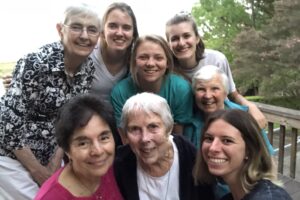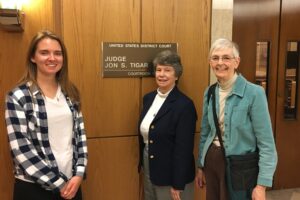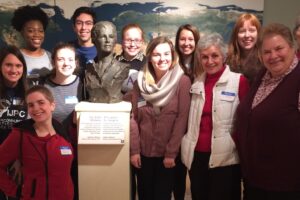HISTORY OF MVC
Mercy Volunteer Corps (MVC) was founded in 1978 by the former Merion Regional Community of the Sisters of Mercy of the Americas as a lay ministry, grounded in the charism of Catherine McAuley, to address the needs of the economically poor and marginalized throughout the United States.
In 1993, MVC was incorporated under the sponsorship of the Institute of the Sisters of Mercy of the Americas, thus establishing it as a ministerial partner of the Sisters of Mercy. In 2000, the first international volunteers were commissioned to serve in Guyana, which continues as a site for volunteers. Since its beginning, MVC has placed more than 1000 women and men in 169 different service sites in 24 states, South America, and Central America, contributing more than 2,042,880 hours of service.
As a sponsored work of the Institute, MVC is a form of commitment to the charism of Mercy, a part of the family of those inspired by Catherine McAuley and provides a transformative opportunity for generous women and men to live in a counter-cultural style. The impact of the MVC experience on the volunteers extends far beyond their term of service.

Mercy Volunteer Corps (L to R) alumna, Lisa Stellino, and current Executive Director, Marian Uba, meet with MVC’s founding Executive Director, Ellen Cavanaugh, RSM.
CATHERINE’S STORY
Catherine McAuley, an Irish Catholic laywoman and the foundress of the Sisters of Mercy was a woman of determination, vision, humor and immense practicality. She was also a woman of deep faith who recognized the many needs of people who were economically poor in early nineteenth century Ireland and she was determined that she, and women like her, could help to relieve their suffering. With an inheritance she opened the first House of Mercy on Lower Baggot Street in Dublin, Ireland, on September 24, 1827 as a place to shelter, feed and educate women and girls.
Catherine’s original intention was to assemble a lay corps of Catholic social workers. Impressed by her good works and wanting the work to continue after her death, the Archbishop of Dublin suggested that she establish a religious congregation. On December 12, 1831, Catherine and two companions took their vows and returned to Baggot Street as the first Sisters of Mercy.
Catherine’s personal experience of God in her life enabled her to open her heart and hands to those around her. Her personal spirituality embraced God’s faithful love and Mercy for all persons. Catherine said “Mercy, the principal path pointed out by Jesus Christ to those who desire to follow Him, has in all ages excited the faithful to instruct and comfort the sick and dying poor and in them they find the person of our Divine Lord.”
Catherine McAuley called her followers to the challenging rhythm of contemplation and action. Catherine viewed prayer and service as reciprocal dimensions of spirituality.
Catherine’s work is continued today by countless Sisters of Mercy, Mercy Associates, Companions in Mercy, Mercy Volunteers, and co-ministers throughout the world. Continually inspired by Catherine’s life and her insistent desire to do something permanent for the poor, uneducated, vulnerable, unskilled, and neglected, the Works of Mercy come to life every day in their hands. The challenge of Catherine McAuley urges us all to “connect the rich to the poor, the healthy to the sick, the educated and the skilled to the uninstructed, the influential to those of no consequence, and the powerful to the weak to do the work of God on earth.”


